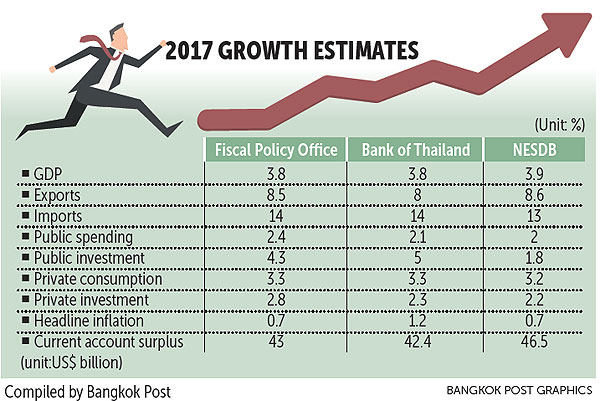Thailand – FPO official: GDP rise of 4% in reach
Thailand’s economic growth is likely to come close to 4% this year after robust momentum continued in October, despite low activity in the month as the country mourned the late King Bhumibol Adulyadej, says a key finance official.
The economy in October avoided a slowdown, and whether GDP growth can reach 4% for all of 2017 will depend on exports in the final two months, said Soraphol Tulayasathien, director of the Macroeconomic Policy Bureau at the Fiscal Policy Office (FPO).
To hit 4% growth, the economy must expand by at least 4.7% in the fourth quarter, Mr Soraphol said.
GDP rose by 4.3% year-on-year in the July-September period — the strongest growth in 18 quarters — after expanding by 3.8% in the second quarter and 3.3% in the first quarter. In the first nine months of 2017, the economy grew by 3.8% year-on-year.
Exports rose for an eighth straight month in October, up 13.1% year-on-year, while the 10-month figure jumped 9.7% year-on-year.
The FPO in late October raised its GDP growth forecast for the full year from 3.6% to 3.8%, the same level as the Bank of Thailand’s forecast but a bit lower than the National Economic and Social Development Board’s estimate of 3.9%.
The FPO’s upward revision was based on a new export growth forecast of 8.5% this year, up from a previous projection of 4.7%.
Mr Soraphol said vehicles, electronic parts and rubber contributed to October’s healthy export growth.
Merchandise shipments to Europe rocketed 28.9% year-on-year in October, their highest growth in five years, while those to India surged 39.4%, also a five-year high.
Domestic passenger car sales in October soared 24.3% year-on-year, signalling a turnaround in the automotive industry.
Looking further ahead, Mr Soraphol said artificial intelligence (AI) will start to play a larger role in economic growth.
He referred to an Accenture report and International Labour Organisation data that AI will add 1.7 times to economic growth by 2035 and raise the world’s labour productivity by 30-40%.
But every coin has two sides. Some 140 million low-skilled workers are at risk of losing jobs with the adoption of AI technology over the next 20 years, while 44% of the Thai workforce — particularly those in the automotive industry — will see their jobs at risk.
McKinsey Global Institute has said that careers related to website development, online marketing, accounting, reporters, editors, lawyers, HR and physicians could be replaced by AI.



 English
English




